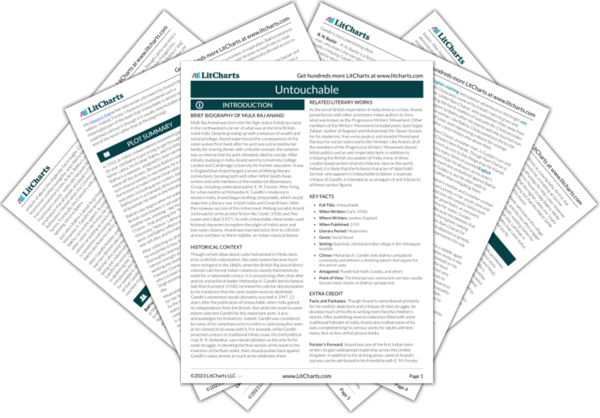Sahib Quotes in Untouchable
[Bakha] had had glimpses, during his sojourn there, of the life the Tommies lived, sleeping on strange, low canvas beds covered tightly with blankets, eating eggs, drinking tea and wine in tin mugs, going to parade and then walking down to the bazaar with cigarettes in their mouths and small silver-mounted canes in their hands. And he had soon become possessed with an overwhelming desire to live their life. He had been told they were sahibs, superior people. He had felt that to put on their clothes made one a sahib too. So he tried to copy them in everything, to copy them as well as he could in the exigencies of his peculiarly Indian circumstances.
“Why are we always abused? The santry inspictor and the sahib that day abused my father. They always abuse us. Because we are sweepers. Because we touch dung. They hate dung. I hate it too. That's why I came here. I was tired of working on the latrines every day. That's why they don't touch us, the high castes. […] For them I am a sweeper, sweeper - untouchable! Untouchable! Untouchable! That's the word! Untouchable! I am an untouchable!”
There wasn’t a child about the 38th Dogras who hadn't cast lingering eyes at this hat. The spirit of modernity had worked havoc among the youth of the regiment. The consciousness of every child was full of a desire to wear Western dress, and since most of the boys about the place were the sons of babus, bandsmen, sea poise, sweepers, washermen and shopkeepers, all too poor to afford the luxury of a complete European outfit, they eagerly stretched their hands to seize any particular article they could see anywhere, feeling that the possession of something European was better than the possession of nothing European.
‘Yes, Sahib, I know,’ said Bakha, without understanding the subtle distinction which the Colonel was trying to institute between himself and the ordinary sahibs in India whose haughtiness and vulgarity was, to his Christian mind, shameful, and from whom, on that account, he took care to distinguish himself, lest their misdeeds reflect on the sincerity of his intentions for the welfare of the souls of the heathen. To Bakha, however, all the sahibs were sahibs, trousered and hatted men, who were generous in the extreme, giving away their cast-off clothes to their servants, also a bit nasty because they abused their servants a great deal.
Bakha saw a sallow-faced Englishman, whom he knew to be the District Superintendent of Police, standing by the roadside in a khaki uniform of breaches, polished leather gators and blue-puggareed, khaki sun helmet, not as smart as the military officers’, but, of course, possessing for Bakha all the qualities of the sahibs’ clothes. Somehow, however, at this moment Bakha was not interested in sahibs, probably because in the midst of this enormous crowd of Indians, fired with enthusiasm for their leader, the foreigners seemed out of place, insignificant, the representative of an order which seemed to have nothing to do with the natives.












